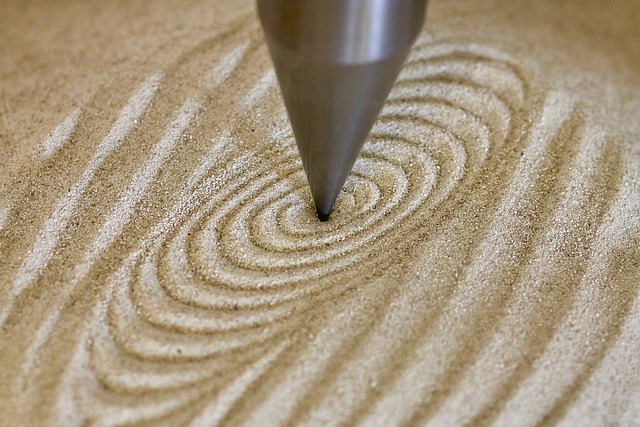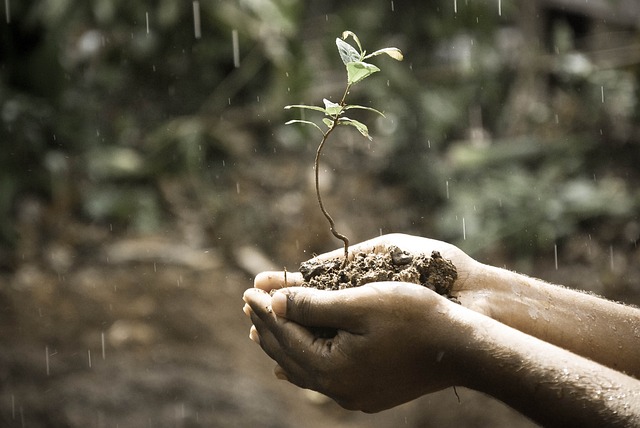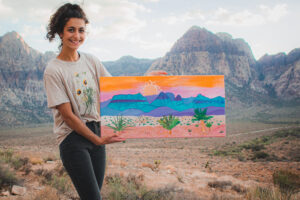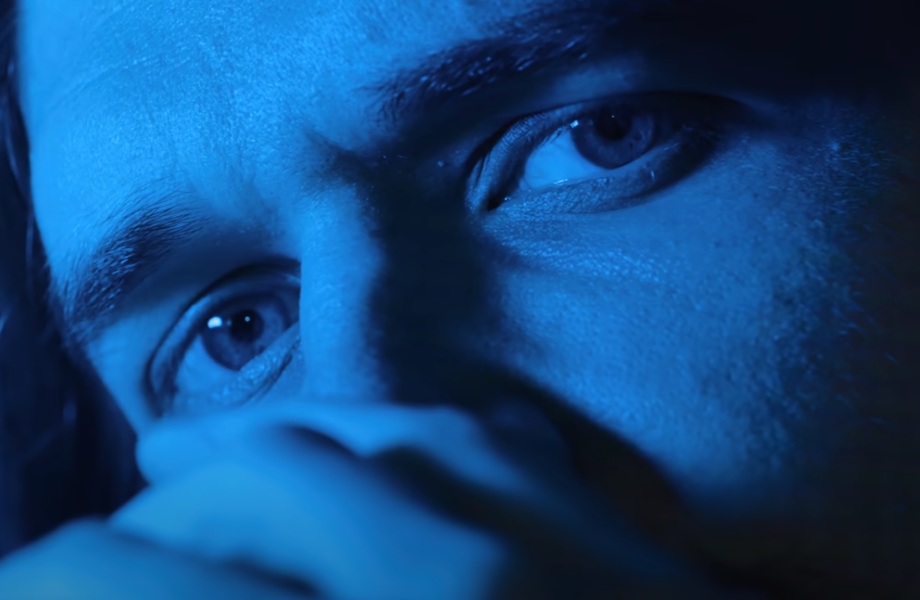
Part 4 of the Climate Crisis Songs Series: ‘All Eyes On Me‘
After almost a year, we’ve finally reached the fourth part of my climate crisis song series: ‘All Eyes on Me‘ by Bo Burnham from his ‘Inside‘ soundtrack!
I finished part three back in May 2023 and then struggled to work on this part for a while. This song spoke to a few topics for me, in addition to the climate crisis, like mental health and the pandemic. It got rough at times to work on this article, not only due to the subject matter I was getting into but also because this song got me through some really difficult times, including while writing this. It’s still my number-one go-to existential crisis song and favorite song from the special.
I had to take a break from writing this part for a while, and then it got put on the back burner. Work, burnout, and shifted priorities, (especially with everything else happening in just the past six months), took my attention and energy away from finishing this longer than I planned. But, I told myself that since this series was meant to be finished in April 2023 for Earth Month, I would at least finish this by Earth Day this year.
I cut it very close. But here it is. So, without further ado, let’s jump right into Part Four.
“Don’t be scared, don’t be shy, come on in, the water’s fine.“
‘All Eyes on Me‘ – Bo Burnham, ‘Inside’ (2021)
MiM Mag does not own the rights to this song or video.
To save time, I won’t go into detail about the entire ‘Inside’ special again. (If you missed Part Three, which covered ‘That Funny Feeling,’ (another song from ‘Inside‘), or you want to recap my summary of the Netflix special and the album, you can read that here.) I will, however, provide some context on this particular song and Burnham a bit before getting into the lyrics.
Now, in the Netflix special, ‘All Eyes on Me‘ begins after transitioning from an emotional moment by Burnham in front of the camera saying he is not doing well and then visibly having a mental breakdown. The camera then zooms in on itself past Burnham sobbing, and fades into the darkness of the camera lense in a mirror before shifting into the beginning notes of the song.
The song then opens to the sounds of a cheering crowd while Burnham addresses an invisible audience, talking to them and then thanking them for supporting him. He then asks the audience (us) to do “one more thing” for him: “Get your fuckin’ hands up, Get on out of your seats, All eyes on me, all eyes on me.”
The Premise of the Song
As much as ‘That Funny Feeling‘ made me feel, this song ‘All Eyes on Me‘ hit me even harder. Perhaps it’s because this song is the climax of the entire Netflix special, culminating everything Burnham created and expressed throughout. There’s much to interpret, from what the words mean for him and to what the words mean to the viewer/listener.
This song and accompanying performance express Burnham’s battle with his mental health over the past several years and in real-time during the pandemic. In the middle of the song, in a monologue, he explicitly shares what happened to him, how he responded, and how he decided to return. The song’s climax follows, including the lyrics I’ll be discussing.
Regarding the song’s premise and Burnham himself, Burnham is a standup comedian, musician, filmmaker, and actor. After getting his start as a teenager on YouTube playing songs on his keyboard in his room, he started doing comedy shows where he played comedic songs with social commentary interwoven into them. Dealing with severe anxiety that manifested as panic attacks while performing on stage, he quit performing for five years to focus on his mental health. At the beginning of 2020, he decided he wanted to perform again.
“And then… the funniest thing happened,” Burnham says, followed by a laugh track as if the audience were there with him reacting in real-time. More specifically, the setting implies that he is performing on stage while the viewer is in the audience, as if at one of his shows.
The pandemic derailed his original comeback plan, so he returned in the form of a surprise Netflix special, which he developed entirely on his own at home during the early pandemic. Few knew he was working on it, and on May 30, 2021, ‘Inside’ debuted on Netflix.
Verses in ‘All Eyes on Me‘ That I Relate to the Climate Crisis
As a reminder, the following are my interpretations of the song’s lyrics in this specific context. Like all the songs in ‘Inside,’ people interpret and relate to the lyrics and other things in innumerable ways, just as Burnham himself implies multiple meanings into things. That’s the artfulness of his style of comedy. I even interpret some of these same lyrics differently when I listen to the song depending on my own mental health that day, what’s happening in the world, and so on. (That said, after you read this article and listen to the song, I’d love to hear your thoughts and interpretations, climate-related or not! Just comment on the related post sharing this piece!)
Now, this song has two verses I feel can be related to the climate emergency as well as the pandemic; one is more vague, and one is hauntingly direct:
“Are you feeling nervous? Are you having fun?
It’s almost over; it’s just begun.
“Don’t overthink this, look in my eye;
Don’t be scared, don’t be shy,
Come on in, the water’s fine.”
…
“You say the ocean’s rising like I give a shit.
You say the whole world’s ending, honey, it already did.
“You’re not gonna slow it, Heaven knows you tried,
Got it? Good, now get inside.”
“Are you feeling nervous? Are you having fun? It’s almost over; it’s just begun.”
Potential References
This verse is vague and can be interpreted many ways, and is likely a nod to several things, including the pandemic. After spending a lot of time in forums reading about and discussing our interpretations of the album with people, I realized that this lyric’s interpretations range from a reference to the ebb and flow of anxiety and other mental struggles, the pandemic, and the climate crisis. In some cases, these are intertwined. For me, it definitely resonates with all of those things. We’ll mostly focus on the climate crisis aspect with a sprinkle of mental health.
Every year it seems summer arrives earlier in the spring and lingers later into the fall. The anxiety of knowing exactly why the weather is weird or extreme creeps in with an everpresent nervousness. I try to have fun, but am often reminded of the state of things one way or another. In respect to ‘Inside,’ this concept is a culmination of the fact that this “fun” project that Burnham started to get progressively darker throughout as his art reflected the state of the world and of his mental health. In a way, he seems to be asking the audience if we are doing okay after an hour long spiral into a satirical rabbit hole. Are we having fun still? Or are we getting nervous about the reality of the world being laid out in front of us?
Coupled with the lyric “It’s almost over; it’s just begun,” it feels like a literary pendulum. Whatever the “it” may be to the interpreter, it is both ending and starting at the same time, in a back-and-forth struggle of emotion.
My Own Back and Forth
With both the climate crisis and my own mental health struggles, I frequently move back and forth about how I feel related to the state of the world, oscillating between “it’s almost over” and “it’s just begun.” I’ll swing on the pendulum moving between fear and numbness as we inch closer to ecological collapse.
It simultaneously feels like we’re at the end of the world (or at least life or humanity as we know it), and the very beginning of the end. That is to say, it feels like the worst is yet to come; all these crises are only just getting started. And perhaps that’s a given, but it’s felt like the world’s been collapsing for years, from an ecological, economical, and social stand point, to name a few aspects. Yet, it also feels like the beginning of something massive. I’m reminded of the quote, “The old world is dying, and the new one struggles to be born; now is the time of monsters.” – Antonio Gramsci
Living Through The Collapse
They don’t really teach us in history classes just how long a collapse takes and what the lead up looks like in explicit detail, year for year. Learning about collapses throughout history and living through one personally are two different things. And experiences multiple collapses in real time is even more exhausting.
Some days the state of the world and the things I hear about make me feel like the end must be in sight, whether that end is for better or worse. Something will happen that seems like a tipping point or a catalyst event, but then nothing changes because of it; it’s still business as usual. Moments in the past few years I thought would be a catalyst event that finally pushed people to act came and went as quickly as the news cycle.
I realize now that instead of a singular event that changes things, it will be the compounding of multiple events across multiple crises until we’re pushed over that inevitable edge where history is changed for ever. And in my back and forth about things, I osciallte between “that future feels beautiful and bright,” and “that future feels very dark and dystopian.”
The Climate Crisis: ‘It’s Just Begun‘
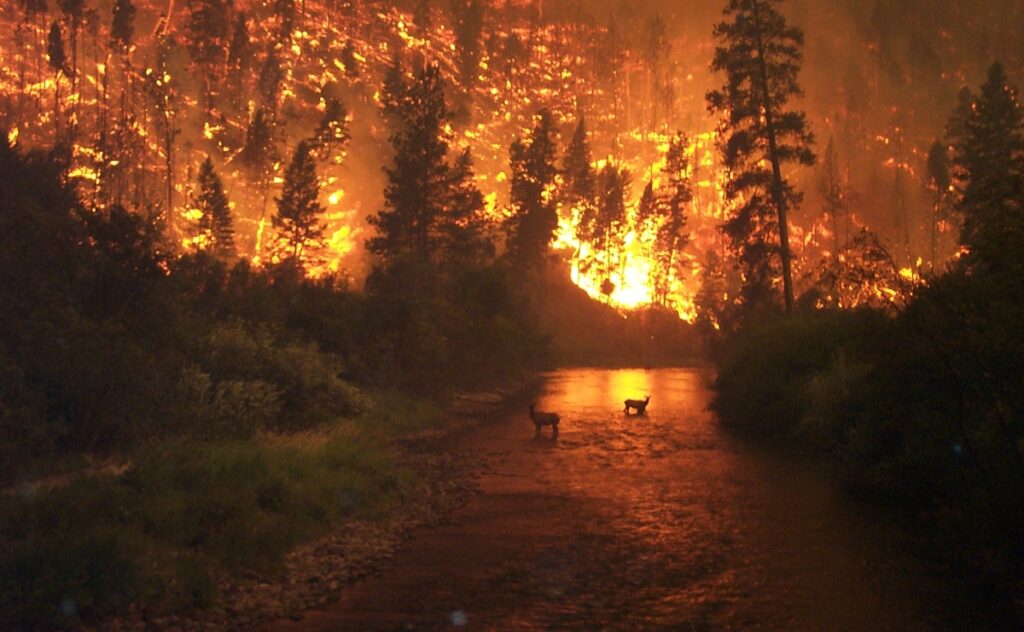
I’m writing this in late April, with a forecast of 90+ degrees for the next few days. It seems we hardly had a winter or spring and went from cold and windy straight to hot and humid. I tell myself the heat is “almost over” for now, as it usually cools down after these early heat waves. But I know the heat’s “just begun” as summer extends each year, and winter disappears entirely. It was hot late into the fall again, hardly dropped below freezing during winter, and an above-average amount of rain fell. For context, our average annual rainfall is 4.19 inches. 2023 saw 9.55; while it’s only April, and we’re already at 4.26 inches.
Coupled with unending “unprecedented” and “once-in-a-lifetime/100-year” extreme weather events, I’m constantly reminded that the climate crisis is just warming up (pun very much intended).
Dealing with the climate crisis isn’t new to Americans. From the people in Louisiana who lost their homes in Hurricane Katrina two decades ago to those leaving California fleeing now-yearly wildfires that insurance companies are refusing to cover. Globally speaking, climate change has contributed to economic and regional conflicts. Here in America, severe weather impacts many different industries and the economy as a whole. A 2024 NOAA NCEI report, “The U.S. has sustained 378 weather and climate disasters since 1980 where overall damages/costs reached or exceeded $1 billion (including CPI adjustment to 2024). The total cost of these 378 events exceeds $2.690 trillion.”
Factoring other societal issues, new horrendous realities arise. For example, every year across the country, unhoused people die from exposure to extreme weather, from freezing to death, or dying from heat stroke. As the climate crisis and housing crisis worsen, more people will die. Imagining this on a global scale makes it more horrifying.
‘Are YOU Feeling Nervous?’
Due to the ongoing barrage of witnessing environmental collapse in real-time, my mental health has worsened over the past several years. I am incredibly concerned about the future. Being aware of the climate shifts here at home makes me wonder: Will Vegas become uninhabitable for at least part of the year due to worsening heat and drought? Will we be forced to move at some point in the near future? Nearly three million people call Las Vegas home – if we can’t adapt to extreme weather or loss of water security, where will we all go?
The answer is that there really won’t be anywhere to go. Climate change will affect everyone, everywhere, and in different extremes of impact, which we’ve already witnessed thus far. There won’t be a place on the planet unaffected by environmental collapse. Hundreds of millions of people in America and billions around the world will become climate refugees at some point. Millions, if not billions, already have. Drought, fires, catastrophic weather events, rising sea levels, and climate-related famines have displaced people at home and abroad.
Truly, we haven’t seen anything yet. As extreme weather events ramp up, the consequences of climate change have only “just begun.” I’m definitely feeling anxious and depressed as I watch things worsen in the world while simultaneously trying to enjoy myself and live life as if the future is bright when it actually feels increasingly dark. So I’m feeling nervous but trying to have fun as we descend into the collapse, and losing more of my sanity every step of the way.
(If you want more climate data, I covered several points in the other three parts of this series.)
(Article continues after the ad)
Please follow our fantastic site sponsors! They make content like this possible! 🙂
“Don’t overthink this; look in my eye; don’t be scared, don’t be shy; come on in; the water’s fine.”
Sitting With the Grief of a Future Lost
For me, this verse feels like a possible call back to ‘That Funny Feeling‘ and the lyric “That unapparent summer air in early fall; The quiet comprehending of the ending of it all.” As I discussed in Part Three about that verse, it feels like a calm acceptance of the knowledge that life as we know it is disappearing, be it from climate change, the pandemic, or everything else happening in the world.
That knowledge might be good in some ways: life wasn’t normal before; we just pretended it was. We don’t have a “normal” to return to, and our “new normal” now has us questioning every facet of humanity in grave detail. Part of this acceptance aspect is about sitting with that knowledge and the resulting grief. This grief is for a lost world, a lost future, and of lost dreams or expectations we had before becoming aware of the reality of things and before things really started to decay around us. And it’s about accepting that things will progressively worsen before they truly get better. (The old world is dying, and the new one struggles to be born.)
Now, assuming this verse is a reference to the previous song, it might be interpreted that Burnham is inviting the audience not to overwhelm themselves with thoughts of this looming dystopian future we see before us. Instead, he beckons us to keep our eyes on him and allow him to pull our attention away from reality, if only for a short while.
Rest Here Weary Traveller
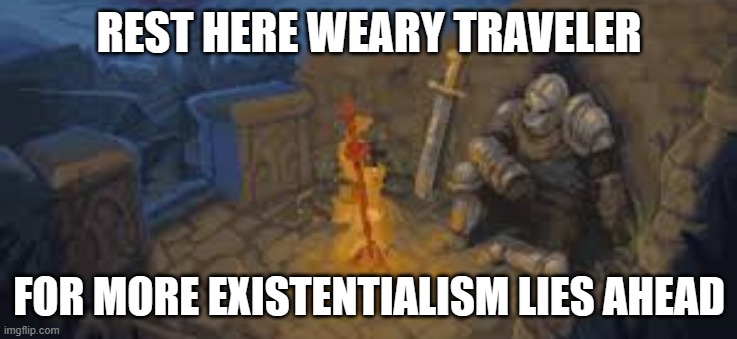
Considering how music comforts people and helps them work through tough times, this verse might arguably also feed into the overall meta-concept of the song itself about the emotional exchange between a performer and the audience. A performer provides entertainment to invoke an emotional response, and the audience provides interpretations in the form of how the performer makes them feel or think. Here, Bo seems to invite us to rest for a while in a way by telling us to not overthink things, and just look in his eye; everything will be all right, at least for the moment.
Alternatively, tying it back to the theme of the climate crisis, other crises, and Burnham’s own struggle with mental health, this verse might also be him telling the audience to join him in giving into hopelessness and be enveloped by its soothing caress. The ocean’s at our door anyway (and the water is getting really warm); we might as well go swimming. And the following verse really compounds that concept.
That said, both of these concepts felt cathartic to me. After all, one premise of ‘Inside‘ the special suggests from the beginning is that Burnham grapples with whether he should be “joking at a time like this” or if he can help by “healing the world with comedy.” I for one felt like I’d just gone through an intense therapy session after watching the entire Netflix special. So I definitely find comedy healing, even when the humor is dark.
“You say the ocean’s rising like I give a shit. You say the whole world’s ending; honey, it already did. You’re not gonna slow it; Heaven knows you tried. Got it? Good, now get inside.“
“You say the ocean’s rising like I give a shit.“
Numbing Our Emotions to Protect Our Sanity
Hearing the words, “You say the ocean’s rising like I give a shit,” hits me in two different ways.
The emotionally exhausted part of my brain agrees and asks, “Yeah, what’s the point of caring so much? What can I do about it, especially when no one else seems to care and the powers that be refuse to act? Why should I even give a shit?” After watching everything happen over the past decade, coupled with scientists’ recent “final warning” to act now, it’s so easy to feel compelled to give in to despair.
And yet, the other, optimistic part of my brain jumps back to the concept of ‘that funny feeling’ I discussed in the previous song essay and how it’s more or less a defense mechanism in response to ongoing crises; it’s a numbness to the pain our very souls feel as our brain works to disassociate from that pain in an effort to protect us and what remains of our sanity.
To put it another way, seeing the coming waves of worsening climate change approach and wash over us makes my brain want to keep me calm by basically letting the tsunami carry me away instead of panicking and trying to run to safety because there’s no high ground to reach in time; nowhere is safe. As Burnham said, “Come on in, the water’s fine.” The existentialism is comforting.
Relating to the Pandemic
Since this song is arguably also related to COVID-19 anxiety, I’ll use an example of how a lot of people feel about the pandemic. As more studies show the lasting effects of COVID, classifying it as a mass-disabling event reducing global immunity, people have become increasingly burned out about caring about it. It seems inevitable at this point that we’re doomed to repeatedly risk catching it as governments carry on like the pandemic is over. (Arguably, it’s also “just begun” as we learn more about the disease and our handling of everything)
And like the ocean rising, as more waves of the virus hit, fewer people are going to “give a shit” if there’s no end in sight and no hope on the horizon. Humanity was given an opportunity to understand how healthcare is a human right, and we chose profits over people yet again, just as we are with the climate crisis.
Fighting to Keep Giving a Shit
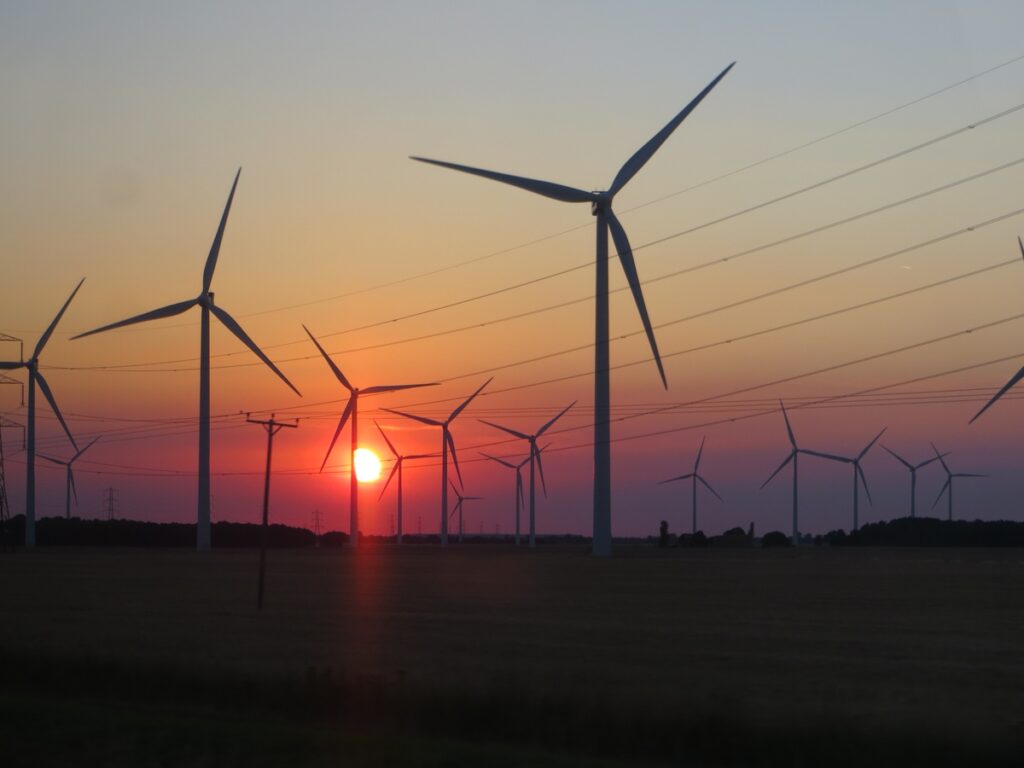
I’ll end this section with this: I’ve been involved in environmental advocacy in one way or another for over seven years now and have spent much longer learning about climate science and the environment. Admittedly, after over a decade of watching things worsen and governments repeatedly ignore warnings from scientists and fail humanity, I’m mentally and emotionally burned out from it all. I am so tired.
And while I still try my best to stay informed and not give up hope or give in to apathy, it is increasingly difficult these days. It’s gotten harder over the years not to say, “Like I give a shit.” Some days, I feel like I’d let the ocean swallow me whole and bury me in its depths.
I am not apathetic; I am numb and exhausted. But, everhopeful.
So, whether it’s the climate crisis or the pandemic, our brains are trying to protect us by not giving a shit and not using up energy being anxious. But in feeling helpless and not caring, it’s making us give up and give in as a society, and thus waste precious time to act. On a hopeful note, we need to remember there are people who care and who are actively working on solutions. Hope is always on the horizon; sometimes, you have to look past the clouds.
(Article continues after the ad)
Please follow our fantastic site sponsors! They make content like this possible! 🙂
“You say the whole world’s ending; honey, it already did. You’re not gonna slow it; Heaven knows you tried. Got it? Good, now get inside.“
Catharsis and the Climate Crisis
I’ve felt like the world’s been ending for ages now, so when I first heard this song, it surprisingly felt very reassuring. It felt like a relief to think that this hellscape might soon be over, for better or worse. As a result, it was both cathartic and jarring when I heard the lyrics, “You say the whole world’s ending; honey, it already did. You’re not gonna slow it; Heaven knows you tried,” for the first time. It was hauntingly existential, poetic, and beautiful.
At that moment, I felt simultaneously hit with astronomically heavy emotions while simultaneously feeling like a weight had been lifted. It spoke to me like a friend telling me, “This was inevitable, and we can only do so much. Try not to worry too much. You did your best.” Or even someone saying, “You’re carrying the world on your shoulders; you don’t have to carry all of that burden by yourself.“
Letting Go of Guilt and Shame
Part of the weight that lifted was the shame and guilt I’d experienced over feeling like I wasn’t doing enough to stop the world from ending or stopping the climate crisis. I’d felt like I wasn’t recycling enough, reducing my carbon footprint enough, or just not doing enough to help fix the world’s problem in general. This song made me reflect on that guilt. Now I know that in reality, the majority of greenhouse gas emissions and contributions to the climate crisis result from the wastefulness and greed of governments, major corporations, a handful of rich people.
While I still advocate for being sustainable where possible, it’s important to understand that individuals are not solely responsible for the world’s vast amount of emissions, waste, and pollution. This means we shouldn’t blame ourselves for not doing enough when the people and insitutions causing the very problems themselves are not doing anything to mitigate the harm they inflict on people or the planet.
The responsibility was put solely on consumers as a greenwashing tactic decades ago when recycling was sold to us as the solution for packaging waste that should have been the responsibility of manufacturers. As for the climate crisis, oil companies covered up reports in the 70s that showed links between fossil fuels and climate change by placing responsibility on consumers. In fact, British Petroleum (BP – famous for its oil spills) coined the term ‘carbon footprint’ for consumers to measure the impact of their own individual greenhouse gas emissions.
Keep Trying
That said, circling back to the idea of the old world dying and the new one struggling to be born, this lyric also evokes that to me. In order for true change to happen, the old world must pass on for the new one to be built. What’s inevitable is that a new world will be born. Just as change itself is inherently inevitable. We can’t stop it, so we should always be trying to find ways to enact positive change. We have to stop trying to stop the old world from ending and focus on what we need to do to ensure that the new world is nurtured.
This is where the “Got it? Good, now get inside” part comes into play. While many relate this lyric to the concept of being told to stay home and stay inside during the beginning of the pandemic, for me, it can relate to something else. It feels akin to being told, “The task is insurmountable, but we can’t give up. Time to get back to work.”
So, when I am trying to be more optimistic about this lyric, I also imagine it as saying, “You can’t stop the world from changing, so just run with it and do what you can while you’re here.”
Again, this is probably just my brain trying to convince myself not to give in to despair. I have to keep trying to help make the world a better place, even if I know it doesn’t stop the world from “ending.” Because perhaps it’s not about stopping or slowing it; it’s about softening the blows of life as things change around us. It’s about kindness keeping reminding us of hope when hope seems lost.
Getting Through the Climate Crisis With Comedy
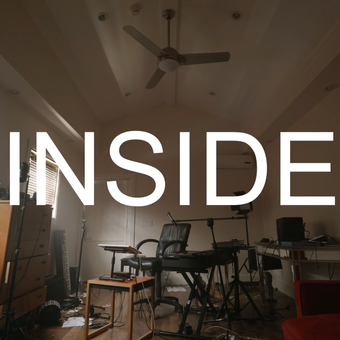
‘Inside‘ is one piece of pandemic art that always reminds me of how powerful a tool comedy and satire truly are. These art forms address truth and reality in meaningful and memorable ways. It calls out the blatant absurdity of things and makes light of a dark world to see us through that darkness. While comedy might not heal the entire world, it can heal individual worlds. Comedy helped Burnham navigate through a difficult time in his life, and then shared that with others who felt healing in it by relating to shared experiences expressed through this comedy special.
This special aired during a tumultuous time in my life and carried me for many months. While this song and the entire Netflix special made me feel incredibly existential, it also left me with much to think about. And it validated things I’d thought or felt in recent years, especially related to the climate crisis, mental health, and the pandemic. I listened to the album on repeat some days and watched the special multiple times since 2021, seeing or understanding things in a new light as time went on and I related more to it.
In particular, I always appreciated how Burnham ends it on a happy, hopeful note as he watches his finished project, and smiles to himself as it ends. This let the audience know that he’s made it through this chapter of darkness and he’s going to be okay. And, we can do the same. We are going to be okay.
Ending on a Hopeful Note
As this Climate Crisis Song series tentatively concludes (until I feel inspired by more songs to write about), it’s interesting to see a year’s difference between the first and last parts. It’s sad that little meaningful change has been enacted in America or around the world and that we’re at risk of losing much of what’s been previously fought for. This goes for action on climate as well as the security of human rights.
Yet, at the same time, it seems more people are waking up to the reality of a number of issues, from the climate crisis to the many humanitarian crises. Moreover, people are seeing how all of the issues we face interconnect. To thoroughly address one issue, we must address them all.
So, let’s get our fucking hands up, get on out of our seats, and focus all our eyes on the future we want to see!
Don’t Despair; There’s Still Time to Care
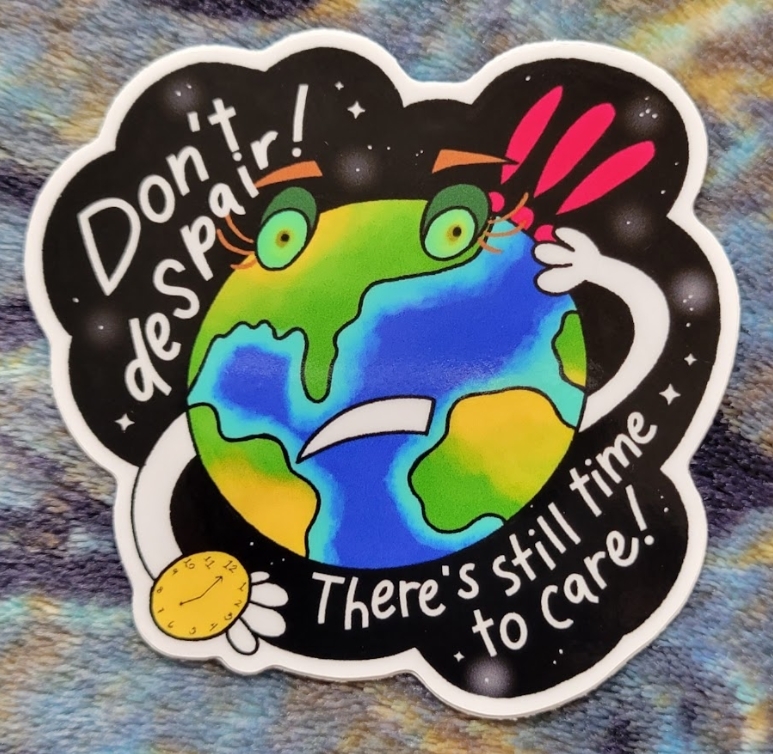
The concept of not giving up helped inspire me to finish making my ‘Don’t Despair finally! There’s Still Time to Care!’ sticker design that I released in 2021. We still have time to act, but we have to act now.
That said, there isn’t a local organization here in the desert addressing sea level rise. So, in addition to reminding you to check out local initiatives like All-In Clark County and organizations like Nevada Plants to help address the impacts of climate change, I’m shamelessly self-plugging my sticker. As a Sticker for Solidarity, I donate to a related cause. And for each sale of this sticker, I plant a tree through One Tree Planted.
Now through the end of April, this sticker and other environmentally-related designs are 20% off in our Etsy and Square store.
Thank you to our supporters and sponsors!
Our magazine is reader-supported! If you enjoyed our content, please join our Patreon community!
As always, we want to thank our Patreon ‘Cultivator’ supporters and sponsors who help make content like this possible.
The following Patron(s) supported the production of this article:
Crystal Gropp
The following sponsors supported the production of this article:
Viva La Compost & LunaKai Lash

